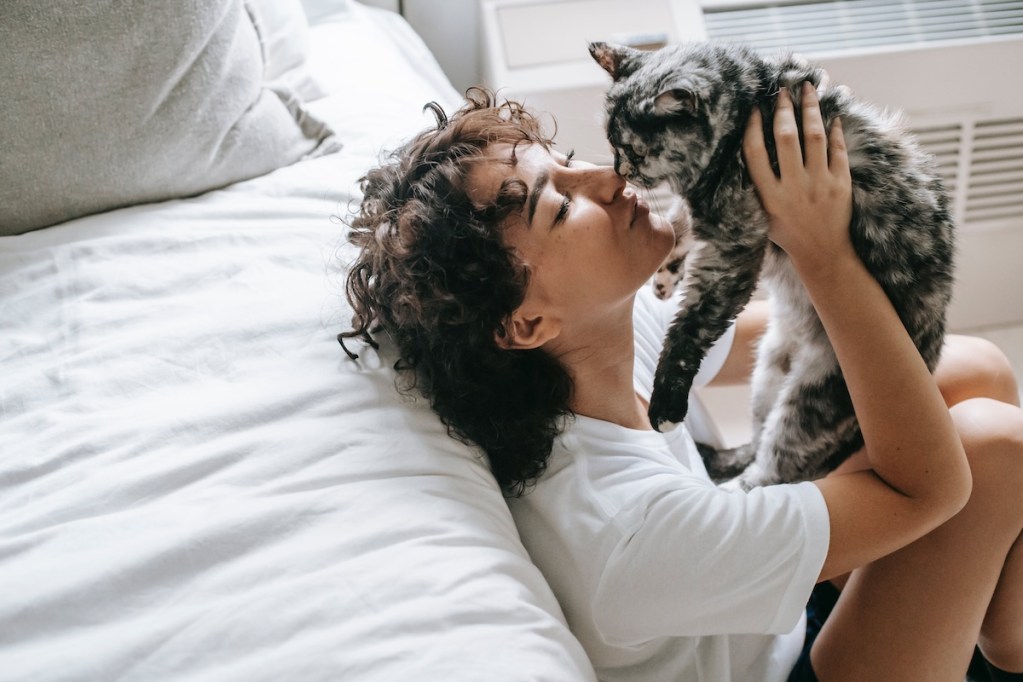When you bought your cat home, you may have expected your new feline to be something of an invisible roommate (or perhaps one that’s never seen but constantly heard at night). We generally consider dogs the more affectionate of the two popular companion animals.
Yet, instead of taking up residence in a corner of your home that not even you know about, your cat’s favorite spot seems to be somewhere unexpected: You. Specifically, your cat may love cuddling on your chest. What gives? What does it mean when a cat lies on your chest, and should you be concerned, flattered, or a mix of both?
The answer will vary from feline to feline. However, the good news is that many of the reasons a cat loves to keep your chest warm will leave you feeling all fuzzy inside.

What does it mean when a cat lies on your chest?
Cats are curious creatures, aren’t they? Each kitty is different, so there’s no one-answer-fits-all to this question. A cat might love lying on your chest for several reasons, and your pet may be making this behavior a habit. Here are some top reasons cats love to snuggle close to their humans’ chests.
- Your cat is cold. You are not. Kitties have a natural fur coat that negates the need to bundle up. However, if you love to keep the heat low, your cat may be cold. You’re a warm-blooded animal, and your pet may be taking advantage of this fact.
- You’re comfortable. Besides being warm, your body may be cozy. Perhaps your pet thinks of you as a total upgrade from the luxury bed you splurged on when you initially welcomed them to your home.
- You’re your cat’s safe space. Cats have a reputation for being fiercely independent, but that doesn’t mean kitty doesn’t get startled or want to feel secure. You are a constant in your cat’s life, so your pet may come to you to feel safe, whether they experienced a specific stressor or need a snuggle.
- Your cat is anxious or stressed. As mentioned, cats can get stressed out by something in particular. For instance, other cats may have invaded your yard, leaving your indoor cat feeling helpless and threatened. Loud noises can also stress out a cat, but they find emotional comfort in you.
- Snuggle time is bonding time. Cats may get a reputation for being less loving than dogs, but that’s untrue. Your cat may love you and want to spend time with you (imagine that), and snuggling into your chest is their preferred way of doing so.
- Your heartbeat is your kitty’s favorite soundtrack. Kittens often lie on or near their mother’s chest. The heartbeat, which they listened to on the inside, can be soothing as they adjust to the outside. Your cat may want to keep the habit and now sees you as their new parent.
- The behavior is biologically and physiologically normal(ish). Speaking of kittens, cats knead or “make biscuits” to stimulate their mother’s milk supply (human babies do it, too). If your cat thinks of you as their parent, they may carry this behavior over — even if you won’t be nursing them.
- Your cat wants attention. Your cat may be trying to get your attention. They could be bored or in pain, and lying on your chest is a way to raise a flag.
- You smell good. Cats have a keen sense of smell and may enjoy being near yours.

Should I prevent my cat from lying on my chest?
If you enjoy the snuggles, there’s no reason to give your cat the boot. Soak up the warmth and all the cuddles and consider it a perk of having an affectionate kitty. Cats can have long nails, so trimming your pet’s can help prevent unintentional injuries during the bonding experience.
If you’re touched out or don’t like having your cat on your chest, that’s OK, too. While cats can be pretty determined to get what they want, there are some ways to curb the behavior, such as:
- Keeping the temperature at one they find comfortable
- Investing in a cozy bed
- Redirecting to another space using toys or treats
- Ensuring you find other ways to bond, such as petting your cat while they are on the floor
- Ensuring your cat feels safe, perhaps by covering up windows that give way to views of other cats on your property

Takeaway
Cats lie on their pet parents’ chests for many reasons, including the desire to feel safe, warm, and loved. Though kitties are sometimes considered anti-social and aloof, many cats adore snuggles — and their humans. Generally, you can take your cat’s love of lying on your chest as a compliment. However, call a vet if your ordinarily unaffectionate cat suddenly begins lying on your chest, and red flags like decreased energy and appetite accompany the behavior.




